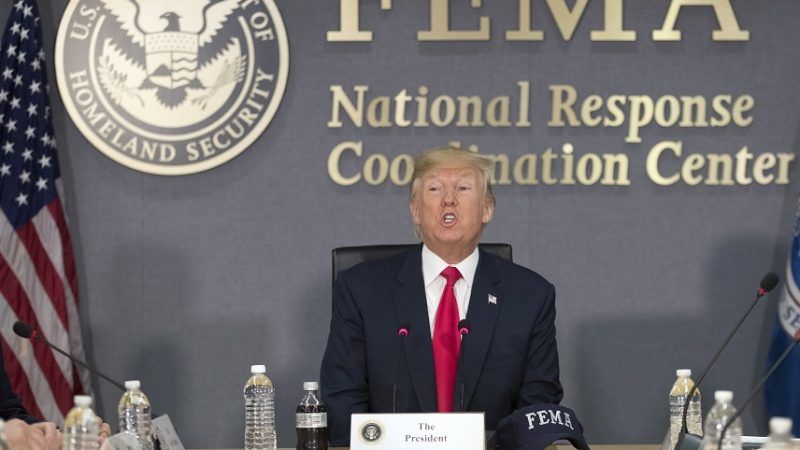Out of the Way, Texas, Federal Hurricane Rescue Is Coming
If history is any indicator, it's going to be a long and very expensive siege.

"I will be going to Texas as soon as that trip can be made without causing disruption," President Trump tweeted Sunday morning. "The focus must be life and safety."
Thanks for the warning.
The Federal Emergency Management Agency is already here, boots on the ground, doing the kinds of FEMA things that have endeared this federal agency to a generation of American taxpayers. Look out now for the recovery housing teams and the National Flood Insurance Program inspectors, Administrator Brock Long promised Jake Tapper on CNN Sunday morning.
When asked by Tapper if Hurricane Harvey-soaked Texans can expect FEMA to be here in the coming weeks and months, Long replied with a can-do expression, "FEMA's gonna be there for years, sir. We're setting up and gearing up for the next couple of years."
Thanks again for the warning.
It might be churlish not to welcome the rescuers (I am writing this from Austin, where the rain from a hurricane 200 miles away is causing flooding), with five people reported dead, millions of people affected in some way, and damages that will surely reach into the billions, as Lt. Gov. Dan Patrick told Fox News this morning.
No one is happier to see this outpouring of federal concern than Texas' conservative political leaders.
"I've got to tell you," Gov. Greg Abbott told anchor Chris Wallace on Fox Sunday morning, "I give FEMA a grade of A plus, all the way from the president down. I've spoken to the president several times, to his Cabinet members, such as secretary of homeland security, such as the administrator of FEMA, such as Tom Price, the secretary of health and human services."
"We could not be more appreciative of what the federal government has done, from the president on down," Abbott gushed to anchor George Stephanopoulos on the creatively named This Week With George Stephanopoulos. "Because, everything we have asked for, they have given us."
Everything. Since Hurricane Katrina in 2005 it has been ruinous for any politician at any level with any authority to offer anything less than everything in a disaster. The bigger the disaster, the bigger the stage.
FEMA's annual budget averaged $700 million throughout the 1980s and was still under $3 billion until the end of the 1990s, according to a study by Chris Edwards, director of tax policy studies at the Cato Institute and editor of DownsizingGovernment.org. In the years after Katrina, the FEMA average budget has been $13 billion and in fiscal 2013, following the last of three consecutive severe hurricane seasons, ballooned to $22 billion.
With all of this spending on Hurricane Harvey, Katrina, and the others, come elected officials exercising control under the guise of leadership.
Right on schedule, and ignoring the admonition of Reason's Katherine Mangu-Ward, Attorney General Ken Paxton announced his office would be manning a consumer protection hotline. In big blue letters on the AG's main page it reads: "Hurricane Harvey—Watch Out For Price Gouging and Scams."
Paxton hasn't been reluctant to dispense with the niceties of having the public step back from taking care of themselves and letting their government take over.
As convinced as these authority figures are that their pronouncements of action are calming and uplifting, we can't help but think how willfully these rescuers ignore the abominable record of the federal government in the aftermath of big blows like Harvey. The tiresomely predictable response so far in Texas is echoed in Reason's exhaustive coverage after Katrina.
"No government screwup is so colossal that it can't be used to justify yet more government," we wrote in our 2005 roundup of the coverage, "After the Storm." "For most liberals, Katrina merely proved that Washington needs more resources to prevent and respond to such disasters; for many conservatives, it proved that society is a fragile construct that can collapse into chaos at any moment, and that only police or military force can hold it together in times of stress."
To cite just a few examples of federal bungling after Katrina noted by Edwards, as much as $2 billion was wasted, at least $1 billion of it in invalid federal aid to 162,750 people who claimed to live in houses that did not exist before the hurricane; $900 million wasted on 25,000 mobile homes that could not be used on flood plains; and $100 million taxpayers paid for bags of ice that never got delivered.
"Among the many superlatives associated with Hurricane Katrina can now be added this one," The New York Times reported in 2006. "It produced one of the most extraordinary displays of scams, schemes and stupefying bureaucratic bungles in modern history, costing taxpayers up to $2 billion."
Rather than tromping all over coastal Texas speechifying and ordering people around, the president and the FEMA stormtroopers ought to listen to the people who made it out on the other side of Harvey.
Like Bill Rogers of Port Aransas, who decided to ride it out in his pickup truck with his wife Paulette and their four dogs, according to a pretty wonderful story in The Dallas Morning News.
Rogers called it the dumbest thing he'd ever done. But wasn't he afraid Harvey would kill him, the reporter asked.
"Death? I ain't afraid of death," he said. "What I'm afraid of is the IRS."


Show Comments (67)